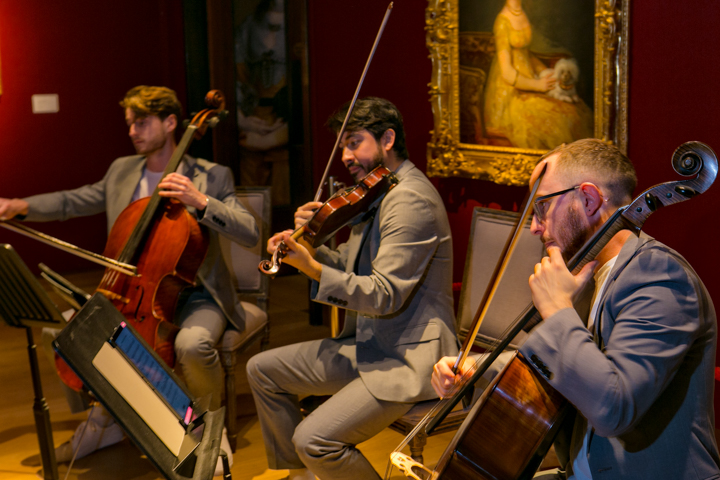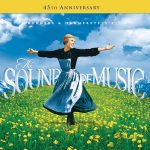Modern string quartet music refers to contemporary compositions written for a string quartet ensemble, consisting of two violins, a viola, and a cello. These compositions push the boundaries of traditional classical music by incorporating new harmonies, rhythms, and experimental techniques.
With a vast range of styles and influences, modern string quartet music offers a diverse and innovative approach to chamber music. From avant-garde and minimalism to fusion and electronic elements, this genre continues to evolve and captivate audiences around the world.

Credit: www.christies.com
The Evolution Of String Quartet Music
From its historical roots to the modern era, string quartet music has evolved and flourished, captivating audiences with its harmonies and intricacies. In this section, we will explore the journey of this genre, highlighting the influential composers of the classical era and how string quartets have transitioned into the modern age.
Historical Roots Of String Quartet Music
- Originating in the late 18th century, the string quartet is a composition for two violins, a viola, and a cello.
- The ensemble gained popularity during the classical period, led by renowned composers such as haydn, mozart, and beethoven.
- These early string quartets were characterized by their balanced and symmetrical structures, adhering to the conventions of the time.
Influential Composers In The Classical Era
- Joseph haydn, often referred to as the “father of the string quartet,” revolutionized the genre with over 80 string quartets. His works showcased technical skill, emotional depth, and thematic developments, setting the stage for future composers.
- Wolfgang amadeus mozart, a prodigious composer, utilized the string quartet as a means of experimentation and innovation, showcasing his mastery of melody and form. His contributions to the genre are invaluable.
- Ludwig van beethoven, a trailblazer in transitioning from the classical to the romantic era, pushed the boundaries of string quartet composition, infusing his works with emotional intensity and dramatic effects.
Transition To Modern String Quartets
- As the 19th and 20th centuries progressed, the string quartet continued to evolve, embracing new musical ideas and techniques.
- Composers like béla bartók, dmitri shostakovich, and benjamin britten expanded the possibilities of the genre, incorporating dissonance, unconventional tonalities, and innovative structures into their compositions.
- Modern string quartets, influenced by diverse musical styles and genres, can now be heard exploring experimental soundscapes, fusing classical traditions with contemporary elements, and collaborating with artists from different disciplines.
The evolution of string quartet music reflects an ongoing journey of exploration, innovation, and creative expression. From its historical origins to the modern era, this genre has continuously pushed the boundaries of musical possibility, captivating audiences and inspiring generations of composers.
Key Characteristics Of Modern String Quartet Music
Modern string quartet music is a dynamic and captivating genre that pushes the boundaries of classical music. With its innovative approach, it brings a fresh perspective to traditional string quartet compositions. In this section, we will explore the key characteristics of modern string quartet music, shedding light on the distinctive elements that set it apart from its classical counterparts.
Exploration Of New Tonalities And Harmonies
- String quartet composers of the modern era are renowned for their eagerness to experiment with new tonalities and harmonies.
- They challenge traditional conventions by delving into dissonance, exploring unconventional combinations of notes that create tension and evoke strong emotional responses.
- By embracing dissonance, modern string quartet music achieves a uniquely captivating and thought-provoking sound.
- Composers employ various techniques such as microtonality, chromaticism, and polytonality to create a rich tapestry of sounds that captivate listeners and stimulate their auditory senses.
- Through this exploration, modern string quartet music transports listeners into uncharted sonic territories, challenging their preconceived notions of what music should sound like.
Use Of Unconventional Techniques And Extended Techniques
- Deviating from the traditional uses of string instruments, modern string quartet music employs unconventional techniques that amplify the expressive possibilities of these instruments.
- Composers experiment with extended techniques, such as playing behind the bridge, col legno (using the wooden side of the bow), or sul ponticello (playing near the bridge).
- These techniques produce unique timbres and textures, adding layers of complexity and depth to the music.
- Incorporating elements of prepared instruments, where various objects are placed on or between the strings, is yet another way modern composers push the boundaries of possibility.
- By embracing these unconventional techniques, modern string quartet music stretches the sonic capabilities of the performers and mesmerizes the audience with its innovative soundscape.
Incorporation Of Elements From Other Musical Genres
- Modern string quartet music thrives on the fusion of different musical genres, bringing together diverse influences to create a truly eclectic sound.
- Composers seamlessly integrate elements from jazz, rock, folk, and world music into their string quartet compositions.
- This integration adds a fresh and contemporary flavor to traditional classical strings.
- Incorporating rhythmic patterns, melodic motifs, and even improvisation from other genres, modern string quartet music captivates listeners with its versatility and ability to transcend musical boundaries.
- The amalgamation of these elements results in a fusion of styles, creating compositions that are both culturally diverse and artistically innovative.
Modern string quartet music displays key characteristics that distinguish it from classical compositions. With its exploration of new tonalities and harmonies, utilization of unconventional techniques, and incorporation of elements from other musical genres, modern string quartet music emerges as a captivating and boundary-pushing genre.
Through innovation and experimentation, it continues to redefine the possibilities of string quartet music in the contemporary music landscape.
Noteworthy Contemporary String Quartets
Quartet Name 1: A Fresh Take On Traditional Repertoire
This talented string quartet brings a breath of fresh air to traditional repertoire, infusing their performances with innovation and creativity. Here are the key points about quartet name 1:
- They skillfully combine classic pieces with their unique interpretation, adding their personal touch to beloved compositions.
- Quartet name 1 captivates audiences with their seamless blend of tradition and modernity, introducing new elements while still staying true to the essence of the original works.
- Their commitment to excellence is evident in their technical skill and attention to detail, resulting in performances that are both captivating and polished.
- By infusing traditional pieces with their own artistic flair, quartet name 1 presents a fresh perspective that appeals to audiences of all ages.
Quartet Name 2: Pushing Boundaries With Experimental Compositions
Quartet name 2 is renowned for their groundbreaking approach to string quartet music, pushing the boundaries of convention with their experimental compositions. Here’s what sets them apart:
- They fearlessly explore uncharted territory, embracing avant-garde styles and incorporating unconventional techniques into their performances.
- Quartet name 2 takes risks and embraces innovation, challenging the norms and redefining what is possible in string quartet music.
- Their experimental compositions captivate and intrigue listeners, offering a unique and immersive experience that pushes the boundaries of the genre.
- Breaking free from traditional constraints, quartet name 2 creates music that is daring, thought-provoking, and refreshingly unconventional.
Quartet Name 3: Impactful Collaborations And Diverse Repertoire
Quartet name 3 stands out for their impactful collaborations and diverse repertoire, offering a rich tapestry of musical experiences. Here’s what you need to know about them:
- They actively collaborate with a wide range of musicians, from renowned soloists to contemporary composers, fostering a vibrant musical community.
- Quartet name 3’s repertoire spans across various genres and styles, showcasing their versatility and ability to adapt to different musical expressions.
- Through their collaborations, they bring together different perspectives and musical traditions, creating performances that are dynamic, engaging, and emotionally resonant.
- With an unwavering commitment to inclusivity, quartet name 3 takes pride in celebrating diversity and showcasing a wide range of musical voices through their repertoire.
The Role Of Technology In Modern String Quartet Performances
Modern string quartet music: the role of technology in modern string quartet performances
Technology has revolutionized the music industry, and the world of string quartets is no exception. From utilizing digital effects and electronic instrumentation to incorporating live looping and layering techniques, modern string quartet performances have taken on a new dimension. Additionally, the use of multimedia presentations has enhanced the audience experience, captivating them in ways never thought possible.
Let’s delve deeper into these technological advancements and their impact on modern string quartet music.
Utilization Of Digital Effects And Electronic Instrumentation:
- Digital effects: String quartets can now experiment with an array of digital effects, such as reverb, distortion, and delay, to create unique and innovative sounds. These effects add depth and texture to the music, pushing the boundaries of traditional quartet performances.
- Electronic instrumentation: Traditional string instruments are being complemented by electronic instruments like synthesizers and electric violins. This fusion allows string quartets to explore a wider range of tones, blending classical and contemporary elements seamlessly.
Live Looping And Layering Techniques:
- Live looping: By using loop pedals and software, string quartets can record and layer different parts in real time, creating complex and intricate arrangements. This technique adds depth and richness to the music, enabling quartets to produce a full and expansive sound even with only four members.
- Layering: String quartets can combine their traditional instruments with the use of pre-recorded loops or backing tracks to enhance their performance. Layering allows for the orchestration of intricate compositions, making the quartet sound much larger than its actual size.
Enhancing The Audience Experience Through Multimedia Presentations:
- Visual projections: String quartets are incorporating visual projections as a backdrop to their performances. These projections can range from abstract designs to narrative-driven visuals, adding a visual storytelling element to the music and engaging the audience on multiple sensory levels.
- Interactive elements: With the help of technology, string quartets can now invite audience participation through interactive elements. This may include live polls, real-time audience feedback, or even allowing attendees to control certain aspects of the performance, creating a more immersive and interactive experience for the audience.
As technology continues to advance, the role of technology in modern string quartet performances will only grow. From the utilization of digital effects and electronic instrumentation to the incorporation of live looping and layering techniques, string quartets are pushing boundaries and captivating audiences in new and innovative ways.
These technological advancements have breathed new life into the world of classical music, bridging the gap between tradition and innovation, and ensuring that the string quartet remains a relevant and exciting art form in the modern era.
Cross-Disciplinary Collaborations In Modern String Quartet Music
Modern String Quartet Music: Cross-Disciplinary Collaborations
In the ever-evolving world of music, string quartets have been at the forefront of pushing boundaries and exploring new avenues of artistic expression. One of the most exciting aspects of modern string quartet music is the extensive range of cross-disciplinary collaborations that have emerged in recent years.
These collaborations bring together the worlds of dance, visual arts, contemporary composers, musicians, and popular music. Let’s take a closer look at some of the key points in each of these areas:
Fusion With Dance And Visual Arts
- String quartets have found new dimensions by collaborating with dancers and choreographers, creating awe-inspiring performances that integrate music and movement harmoniously.
- The blending of live music with dance adds a layer of visual storytelling to the music, enhancing the emotional impact and creating a multisensory experience for the audience.
- Innovations in technology have allowed for the integration of visuals and projections, transforming string quartet performances into immersive visual spectacles that captivate and engage the viewers.
- This fusion of music, dance, and visual arts pushes the boundaries of creativity and offers a fresh perspective on how these art forms can interact and influence each other.
Collaborations With Contemporary Composers And Musicians
- String quartets have been actively collaborating with contemporary composers, commissioning and premiering new works that push the boundaries of traditional chamber music composition.
- By working closely with composers, string quartets are able to contribute to the creation of new musical languages and explore unique sonic landscapes.
- These collaborations often result in works that reflect the artistic vision of both the composer and the quartet, resulting in performances that are both challenging and rewarding for performers and audiences alike.
- The collaboration between string quartets and contemporary musicians from various genres, such as jazz, folk, and electronic music, has also brought about innovative and genre-defying works that blur the lines between classical and contemporary music.
Exploring The Intersection Between Classical And Popular Music
- Modern string quartets have been actively exploring the intersection between classical and popular music genres, bridging the gap between them and appealing to a wider audience.
- String quartets incorporate elements from popular music, such as catchy melodies, rhythmic patterns, and improvisation, into their performances, adding a contemporary twist to their repertoire.
- By reinventing and reimagining popular songs through the lens of classical string quartet instrumentation, these ensembles breathe new life into familiar tunes, appealing to both classical music enthusiasts and fans of popular music.
- This exploration of the intersection between classical and popular music not only expands the string quartet repertoire but also demonstrates the versatility and adaptability of this ensemble in embracing diverse musical styles.
The cross-disciplinary collaborations in modern string quartet music have opened up exciting new avenues of artistic expression. By fusing their music with dance and visual arts, collaborating with contemporary composers and musicians, and exploring the intersection between classical and popular music, string quartets have been able to redefine the boundaries of their genre and captivate audiences with innovative and engaging performances.
The Impact Of Modern String Quartet Music On The Classical Music Landscape
Modern string quartet music has made significant strides in revitalizing interest among younger audiences, bridging the gap between traditional and contemporary musical styles, and opening doors for experimentation and innovation within the genre.
Revitalizing Interest In Classical Music Among Younger Audiences
- Engagement through fusion: Modern string quartet music incorporates elements of popular genres, such as rock, jazz, and electronic, attracting younger listeners who may not have been inclined to explore classical music.
- Relatability factor: By infusing modern string quartet music with relatable themes and emotions, it resonates with younger audiences, giving them a sense of connection and relevance.
- Collaborative initiatives: String quartets actively collaborate with young composers and artists from different musical backgrounds, keeping classical music vibrant and appealing to the younger generation.
- Social media presence: Leveraging platforms like youtube, instagram, and tiktok, string quartets engage with younger audiences through innovative and visually captivating content, establishing a strong online presence.
Bridging The Gap Between Traditional And Contemporary Musical Styles
- Contemporary compositions: Modern string quartet music combines traditional techniques with contemporary compositions, creating a unique blend that appeals to a wider range of listeners.
- Expanding repertoire: String quartets explore diverse musical styles and incorporate contemporary influences, extending the boundaries of traditional classical music.
- Enriching live performances: By weaving elements of improvisation, extended techniques, and electronic elements into their live performances, string quartets captivate audiences, transcending the boundaries of the classical music experience.
Opening Doors For Experimentation And Innovation Within The Genre
- Embracing interdisciplinary collaborations: Modern string quartets collaborate with artists from various disciplines like dance, visual arts, and multimedia, enriching the overall artistic experience and pushing the boundaries of traditional quartet performances.
- Exploring unconventional techniques: String quartets experiment with extended instrumental techniques, alternate tunings, and unconventional playing methods, expanding the sonic possibilities and allowing for fresh and innovative compositions.
- Commissioning new works: String quartets actively commission and premiere contemporary compositions, providing a platform for emerging composers and encouraging the exploration of new musical ideas.
- Creating immersive experiences: By incorporating technology, unconventional staging, and multimedia elements, string quartets create immersive and interactive performances that engage audiences in new and exciting ways.
Modern string quartet music has undoubtedly had a profound impact on the classical music landscape, breathing new life into the genre, attracting younger audiences, and fostering an environment of creativity and innovation. With its ability to fuse traditional and contemporary styles, modern string quartet music ensures that classical music remains relevant, dynamic, and ever-evolving.
Exploring The Future Of Modern String Quartet Music
Modern string quartet music: exploring the future of an evolving genre
There is an undeniable beauty in the harmonious interplay of four string instruments. String quartet music has captivated audiences for centuries, but in the modern era, this genre is experiencing an exciting evolution. From predictions for the genre’s future to embracing diversity and inspiring the next generation of musicians, let’s delve into what lies ahead for modern string quartet music.
Predictions For The Evolution Of The Genre
The realm of modern string quartet music is brimming with possibilities. As we peer into the future, several trends and developments emerge:
- Experimentation with genres: String quartets are pushing boundaries by incorporating elements from various musical genres like jazz, rock, and electronic music. This fusion allows for fresh and innovative compositions that challenge traditional conventions.
- Collaborations with contemporary composers: String quartets are embracing collaborations with modern composers who bring a fresh perspective to the genre. These collaborations yield groundbreaking compositions that blend classical techniques with new and exciting ideas.
- Integration of technology: Technological advancements offer a wealth of opportunities for string quartets. From incorporating electronic effects to using digital instruments, technology opens up new avenues for creativity and experimentation.
Embracing Diversity And Inclusivity In Repertoire And Performers
As the modern world becomes increasingly diverse, it is imperative that the string quartet genre reflects this evolution. To promote inclusivity and embrace diversity, the following initiatives are being pursued:
- Expanding repertoire: String quartets are broadening their repertoire to include compositions from underrepresented voices and cultures. By showcasing a diverse range of pieces, quartets can share different musical perspectives and engage wider audiences.
- Welcoming diverse performers: String quartets are actively seeking musicians from diverse backgrounds to join their ensembles. This not only brings fresh perspectives and unique artistic voices to the genre but also creates a more inclusive and representative musical community.
- Collaborative projects: String quartets are partnering with musicians from various backgrounds and genres to collaborate on projects. These collaborations foster creative cross-pollination and bridge gaps between different musical worlds.
Inspiring The Next Generation Of String Quartet Musicians
To ensure the longevity and vitality of the genre, inspiring the next generation of string quartet musicians is of utmost importance. Various strategies are being employed to achieve this goal:
- Educational outreach programs: String quartets are actively engaging with schools and educational institutions to introduce young students to the beauty and artistry of string quartet music. By offering workshops, masterclasses, and performances, quartets inspire and ignite a passion for this genre.
- Mentorship opportunities: Experienced string quartet musicians are taking on mentorship roles to nurture young talent. By providing guidance, support, and insights into the profession, these mentorship programs empower aspiring musicians to pursue successful careers in the field.
- Innovative projects and competitions: String quartets are spearheading innovative projects and competitions that excite and challenge young musicians. These initiatives provide platforms for aspiring quartets to showcase their skills and gain recognition, giving them the motivation to pursue a future in string quartet music.
The future of modern string quartet music is bright and promising. With predictions of genre evolution, a focus on inclusivity, and efforts to inspire the next generation of musicians, string quartets are poised to captivate audiences and adapt to the changing tides of music in the years to come.
Frequently Asked Questions For Modern String Quartet Music
What Is Modern String Quartet Music?
Modern string quartet music refers to contemporary compositions for a quartet of string instruments, such as two violins, a viola, and a cello. It incorporates different musical styles, techniques, and influences, ranging from classical to jazz, pop, and even rock.
This genre offers a fresh and innovative take on the traditional string quartet repertoire.
What Are The Characteristics Of Modern String Quartet Music?
Characterized by its experimentation, modern string quartet music often features unconventional harmonies, rhythmic complexities, and extended techniques. It explores new sound possibilities, including the use of electronics or non-traditional playing methods. This genre strives to push boundaries while maintaining the emotional depth and expressive qualities of classical string quartet music.
Who Are Some Notable Composers Of Modern String Quartet Music?
Composers such as philip glass, steve reich, and arvo pärt have made significant contributions to modern string quartet music. Their compositions showcase unique styles and innovative approaches, defining the genre and inspiring subsequent composers. Their works often blend minimalism, repetitive patterns, and spiritual themes, creating captivating and thought-provoking musical experiences.
Conclusion
As the world of music continues to evolve, modern string quartet music stands out as a dynamic and captivating genre. The fusion of traditional string instruments with contemporary elements has created a unique and thrilling musical experience. With its ability to convey a wide range of emotions, modern string quartet music has found its place in both classical and popular music arenas.
The intricate harmonies, innovative compositions, and skilled performances have not only revitalized classical music but have also attracted new audiences. This genre demonstrates the versatility and adaptability of string instruments, pushing boundaries and challenging perceptions. Whether it’s a hauntingly beautiful melody or an energetic and rhythmic arrangement, modern string quartet music captures the essence of our time.
By blending the old and the new, this genre creates a sonic landscape that speaks to the heart and soul of contemporary music lovers. Embrace the power and beauty of modern string quartet music and allow yourself to be transported to a world of enchantment and wonder.












